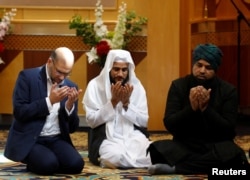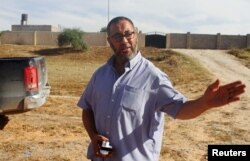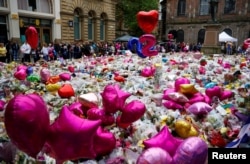The mosque where the Manchester bomber prayed is coming under the spotlight after it emerged at least two other British recruits of the Islamic State also worshipped there.
One of the recruits, Khalil Raoufi, died fighting in Syria in 2014. The other, Ahmed Ibrahim Halane, is living in Denmark, where he holds citizenship and is banned from re-entering Britain.
Halane's sisters, Zahra and Salma Halane, who traveled to Syria to become "jihadi brides," are believed also to have worshipped at the mosque, say local Muslims.
Last week, trustees of the Didsbury Mosque and Islamic Center issued a statement condemning as an act of cowardice the Manchester Arena bombing by 22-year old British-Libyan Salman Abedi. The bombing left 22 people dead and 100 injured.
The trustees detailed clashes Abedi had with imam Mohammed Saeed over sermons he delivered denouncing IS in 2015. Saeed said Abedi looked at him "with hate" after he gave a sermon criticizing IS and militant Libyan group Ansar al-Sharia. Saeed said most of the mosque's members supported the condemnation of IS, although a few signed a petition criticizing him.
Saeed said he reported his worries about Abedi's friends to the police. Manchester police say the mosque is not under investigation.
Inconsistent statements
Mosque elders have been inconsistent in their remarks about Salman Abedi and his attendance at the mosque. Saeed acknowledged the suicide bomber was a regular worshipper until the 2015 argument over IS. But mosque chairman, Muhamad el-Khayat, said last week while other family members were regulars, Salman Abedi "himself we did not know, maybe we have seen him once."
The bomber's father Ramadan was a member of the anti-Gadhafi Libyan Islamic Fighting Group that had ties to Osama bin Laden but whose
leaders insist they never affiliated to al Qaida . Ramadan called worshippers to prayer at the Manchester mosque before he moved back to Libya after the ouster of Muammar Gadhafi. He is being held by a vigilante militia in Tripoli along with one of his sons, who the militia says has confessed to IS membership and was involved in a plan to assassinate U.N. envoy to Libya Martin Kobler.
Mosque elders have also appeared defensive. They have refused to allow the media into the mosque and tried to block a Muslim reporter from the BBC from entering to pray.
During Friday prayers, el-Khayat told worshippers the media interest in the mosque, which has been receiving threats and hate mail and is being guarded by police, had been overwhelming. He said the elders fear being misinterpreted.
"We strongly continue to condemn the horrendous crime that was committed," he said. He praised Britain as a hospitable country for Muslims.
But his remarks aren't silencing mounting criticism from Muslim activists opposed to militant Islamic ideologies. They say the mosque must bear some responsibility for Abedi's radicalization because of the conservative Salafi brand of Islam it espouses.
Providing platform for hate
Maajid Nawaz, who helped found the London-based counter-extremist group, Quilliam, has accused the Didsbury mosque of hosting preachers who expressed anti-Semitic and anti-liberal views.
Speaking on London radio station LBC, Nawaz, a British-Pakistani, refused to praise the mosque for its condemnation of IS, saying "the biggest danger to our community at the moment is extremist preachers like this, using mosques that tolerate extremist preachers like this, that breed jihadist terrorists."
"Until we can separate these extremists from our community and isolate them, don't blame the rest of society for wondering whether every Muslim is an extremist, when our mosques are hosting the extremists themselves," he added.
There has been fierce debate in Britain in recent years about the role mosques play, unwittingly or not, in the process of radicalization. In 2015, Conservative peer Baroness Warsi, a Muslim, claimed most radicalization is happening online and not at mosques.
But two British government reports have warned extremists take advantage of mosques and other institutions, including universities, to spread a "poisonous narrative."
In a recent study of British IS recruits for the Henry Jackson Society, British research institute analyst Emma Webb warned some mosques have "functioned as spaces in which extremists could socialize with each other and form relationships" and where extremists can begin the process of recruitment.
She told VOA some family members of British IS recruits complain that by providing a platform, even for non-violent Salafi ideology, some mosques are playing a role in the radicalization process.
"It isn't so much that they recruited them," she argued, "but that they gave them an ideology that allowed them to think it was okay to kill Shi'ites and okay to hate certain people, so it made it easier for them to be recruited subsequently."







